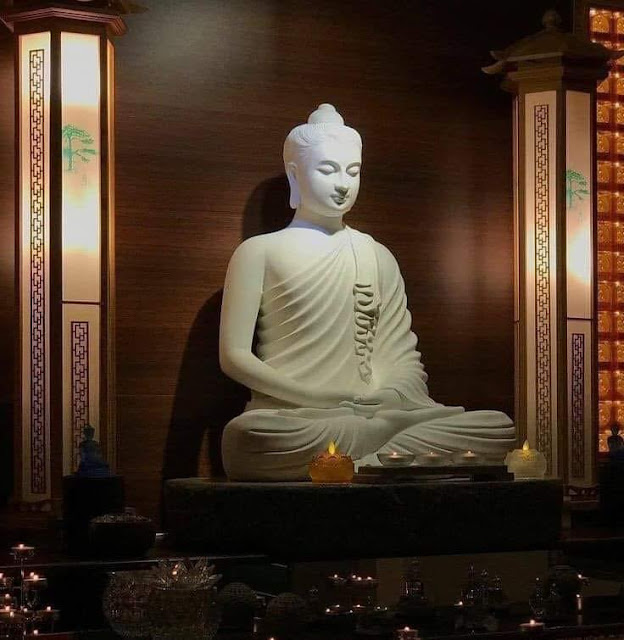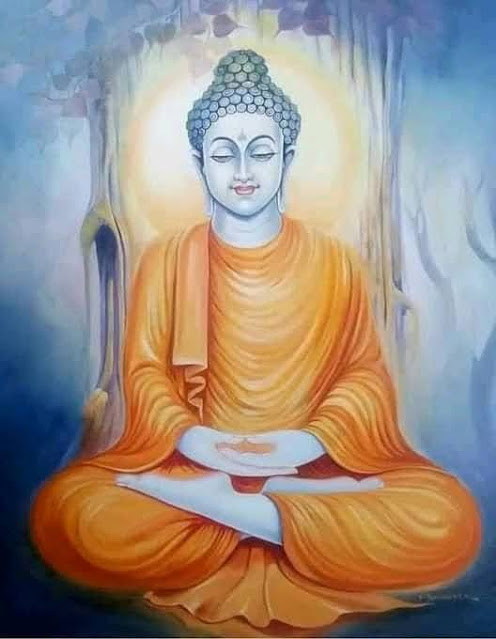Belief in Deities (Devas).
—Venerable K. Sri Dhammananda Maha Thera
Buddhists do not deny the existence of various gods or deities.
Devas are more fortunate than human beings as far as sensual pleasures are concerned. They also possess certain powers which human beings usually lack. However, the powers of these deities are limited because they are also transitory beings. They exist in happy abodes and enjoy their life for a longer period than human beings do. When they have exhausted all the good kamma, that they have gathered during previous birth, these deities pass away and are reborn somewhere else according to their good and bad kamma. According to the Buddha, human beings have more opportunities to accrue merits to be born in a better condition, and the deities have less chances in this respect.
Buddhist do not attribute any specific importance to such gods. They do not regard the deities as a support for the moral development or as a support for the attainment of salvation of Nibbana. Whether they are great or small, both human beings and deities are perishable and subject to rebirth.
It is a common belief amongst the Buddhist public that such deities can be influenced to grant their favours by transferring merits to them whenever meritorious deeds are performed. This belief is based on the Buddha's injunction to the deities to protect those human beings who lead a religious way of life. This is the reason why Buddhists transfer the merits to such deities or remember them whenever they do some meritorious deeds. However, making of offerings to and worshipping such deities are not encouraged, although some Buddhist customs center around such activities. When people are in great difficulties, they naturally turn to the deities to express their grievances in a place of worship. By doing this, they gain some relief and consolation; in their hearts, they feel much better. However, to an intellectual who has strong will power, sound education and understanding, such beliefs and actions need not be resorted to. There is definitely no Teaching in Buddhism to the effect that Buddhists can attain Nibbana by praying to any deity. Buddhists believe that 'purity and impurity depend on oneself. No one from outside can purify another.' (Dhammapada 165)
Buddhahood and Nibbanacan be attained without any help from an external source. Therefore, Buddhists can practise their religion with or without the deities.
Credit: Buddhism For World Peace And Humanity
Other articles 👉 Karaniya Metta Sutta Chanting , Mangala Sutta Chanting - The greatest blessing , Are Buddhists Idol Worshippers? , Attainment of Buddhahood , Faith, Confidence and Devotion , Loving-Kindness , Can We Justify War? , Dreams and Their Significance , Buddhism and Women , Modern Religion , Is Buddhism a Theory or a Philosophy? , Hi Beloved Community! , Are Buddhists really idol worshippers? , Which is the Proper Religion? , Religion in a Scientific Age , How to Save Yourself , Why is there no Peace? , You Protect Yourself , Moral and Spiritual Development , Do It Yourself , Everything is Changeable , The Meaning of Prayer , What is the purpose of life? , The Buddha's Silence , Kathina Robe Dana festival , What is Kamma? , The teachings of Buddha , What is Kamma? , Pavāranā day , The Law Of Karma , The First Buddhist Council , Practical Vipassana Meditational Exercises By Ven. Mahasi Sayadaw , There are six supreme qualities of Dhamma , Buddhist Paintings: The Life of the Buddha , The life of the Buddha , What is Buddhism? , A Basic Buddhism Guide , The Eight-Fold Path is the fourth of the Four Noble Truths - the first of the Buddha's teachings , A Gift of Dhamma , WHAT DID THE BUDDHA TEACH? , THE FOUR NOBLE TRUTHS , A Dhammatalk by Ajahn Chah: The Four Noble Truths , The Middle Way of Buddhism , The Path to Peace , The Middle Way Within , The Training of the Heart , Right Practice - Steady Practice , Question and Answer about Dhamma (QA1 - QA10) , Question and Answer about Dhamma (QA11-QA18) , Questions and Answers with Ajahn Chah , A Dhammatalk by Ajahn Chah: Questions and Answers , Even One Word Is Enough , Right Restraint , Listening Beyond Words , Where did the Buddha enter Nibbāna? , Knowing the World , Wholehearted Training , Understanding Dukkha , Monastery of Confusion , It Can Be Done , About Being Careful , Unshakeable Peace , Suffering on the Road , Clarity of Insight , Evening Sitting , Transcendence , "Not Sure!" - The Standard of the Noble Ones , Sense Contact - the Fount of Wisdom , In the Dead of Night... , The Flood of Sensuality , Sammā Samādhi - Detachment Within Activity , Maintaining the Standard , Understanding Vinaya , Dhamma Fighting , Toward the Unconditioned , Still, Flowing Water , ''Tuccho Pothila'' - Venerable Empty-Scripture , Living in the World with Dhamma , Meditation , Our Real Home , Why Are We Here? , Making the Heart Good , Epilogue , Right View - the Place of Coolness , No Abiding , Convention and Liberation , The Peace Beyond , The Path in Harmony , On Meditation , Training this Mind , Just Do It! , Reading the Natural Mind , Living With the Cobra , The Two Faces of Reality , Dhamma Nature , The Last Message of the Buddha , The towering Phra Buddha Maha Nawamin of Wat Muang is one of the tallest statues in the world , "Happy Honey Full Moon Day" , Phra Phuttha Rattana Mongkhon Mahamuni at Wat Bhurapha Piram , The Big Buddha Phuket , Wat Muang, largest sitting Buddha statue in Thailand , The Big Buddha (Hong Kong) , Wat Tham Pha Daen a beautiful hill top temple , WatYaiChaiMongkol (Mongkhon), Ayutthaya, Thailand. , The sacred Buddha head in the roots of the Bodhi Tree. , Wat Phai Lom

.jpg)
.jpg)
.jpg)
.jpg)
.jpg)








.jpg)





0 comments: